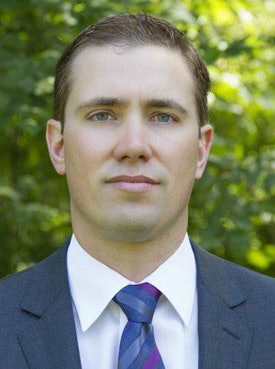WASHINGTON — During this politically tumultuous time, the governance studies program at the Brookings Institution refocused attention on mass incarceration on Monday. An audience gathered in its Falk Auditorium for a panel discuss criminal justice reform.
 Shon Hopwood
Shon HopwoodVirginia’s governor and keynote speaker Terry McAuliffe condemned the White nationalists who rallied in Charlottesville earlier this month. “They are not patriots, they are cowards,” McAuliffe said. “Let us be clear: this isn’t a debate about monuments.”
He went on to describe his administration’s achievements in criminal justice reform, emphasizing that the United States has one of the highest incarceration rates in the world. These remarks helped frame the morning’s discussion, which also aired on CSPAN and was streamed online.
After McAulliffe left the podium, four experts discussed a variety of criminal justice issues on a panel moderated by DeRay Mckesson, an activist and former senior director of human capital with Minneapolis Public Schools.
“I saw more drugs in federal prison than I ever saw out,” said Shon Hopwood, an associate professor of law at Georgetown University. He served a 12-year prison sentence for robbing five banks. Since then, he has finished an undergraduate and law degree and authored a 2012 memoir titled Law Man: My Story of Robbing Banks, Winning Supreme Court Cases, and Finding Redemption.
Hopwood said that criminal justice needs to be reformed from top to bottom, from policing to the reentry of released inmates as well as the conditions of the prisons themselves.
Brittany Packnett, who has experience as a teacher, activist and executive director of Teach for America, said “multiple systems are complicit. . . It’s not just prisons, it’s not just about police, it’s not just about prosecutors and defenders. It’s about all of this.”
She referred to the cradle-to-prison pipeline and the way children are locked into a pathway toward incarceration. Packnett also drew attention to the thousands of women who are pregnant in prison, and the horrible conditions in which they are forced to give birth.
Clint Smith is a poet, a doctoral candidate in education at Harvard University and a former high school English teacher. He emphasized the need to reform the prosecutorial process. “Prosecutors have a wide range of discretionary power that is often used to put people away for much longer than they need to be.”
The speakers addressed a question regarding the how colleges and universities can contribute to criminal justice reform.
“Postsecondary education is the great equalizer,” said Hopwood, who noted that he was deeply impacted by the academic opportunities presented to him following his release from prison.
“Going into university is a really good community for them to get back on their feet,” he said. For Hopwood, this is why universities need to revise admissions processes to accept more formerly incarcerated individuals. “You have teachers that really go to bat for you. The last thing you want to do is commit a new crime and let them down.”
He mentioned the Post-Prison Education Program in Seattle as an example of the difference higher education can make. According to Hopwood, the recidivism rate in the entire city is 55 percent, but that number goes down to two percent amongst participants in the program.
Packnett emphasized the need for universities to partner with nontraditional K-12 programs that allow women to work while attending school. She said that a friend who directed this type of K-12 school struggled in this regard. “It was hard for her to find institutions of higher education that were willing to put in the resources, the time and talent to actualize that kind of partnership.”
According to Smith, the relationship between higher education and prisons was severed decades ago. Despite the research showing lower recidivism rates among former inmates who received an education while incarcerated, legislation in 1994 stripped universities of federal and state incentives for teaching in prisons.
“It’s difficult to overstate the extent to which the ‘94 crime bill really decimated the entire landscape of education,” he said. Smith also mentioned a pilot program started under President Obama to provide Pell Grants to prisoners, but he said it’s a policy that “we are unlikely to see continue under our current administration.”
For Smith, access to education is one of the ways in which the disparity between the incarcerated community and the larger public is most visible.
“People don’t understand the totality of the landscape of executive power that exists,” he said. “In prisons, that is something that is felt very deeply.”


















